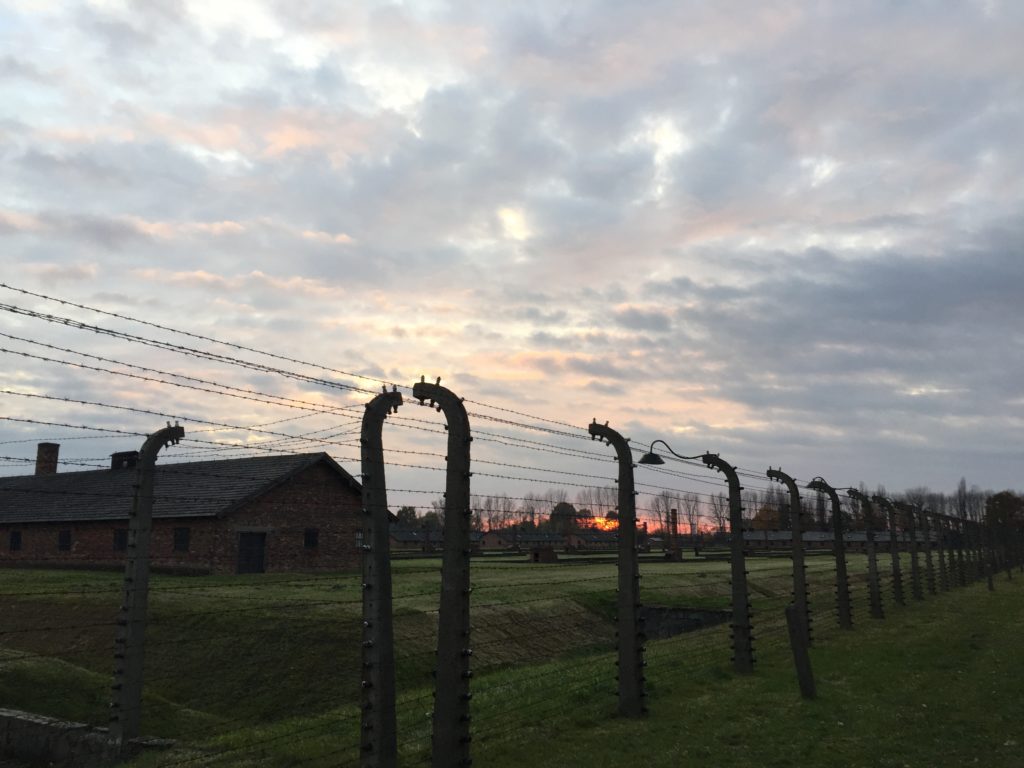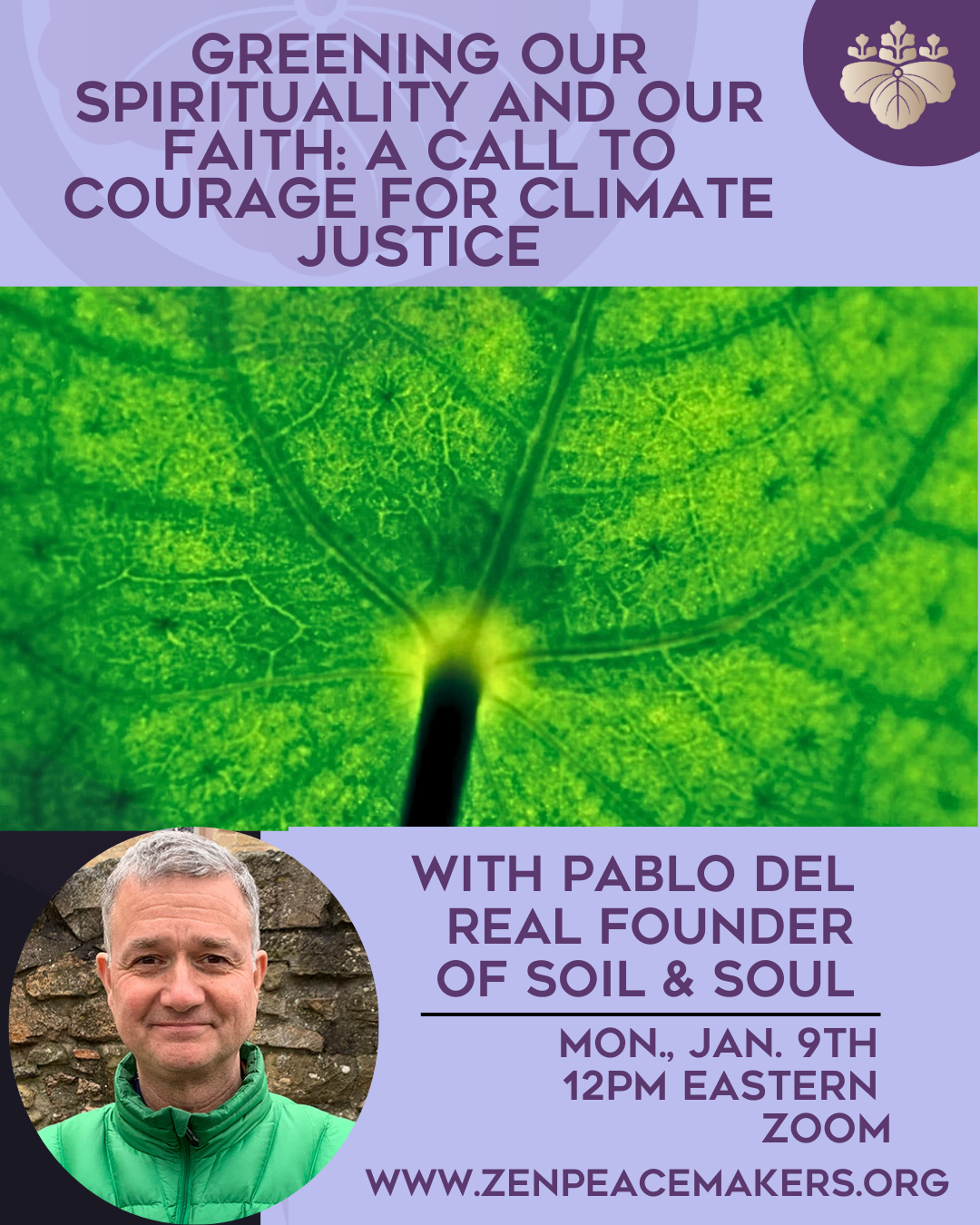I did not go to Auschwitz to find out what happened there, nor to understand the worst that the human mind can do. Nor did I go in sympathy with the suffering of the Jews and others killed and tortured there.
The only reason to go was to discover to what my own heart and mind could open from staying with such a dire, unbearable, and unfathomable event. I asked how the potential or actuality of what produced Auschwitz, is present and manifesting in my life? Can this experience help me learn and connect with my own humanness, help me in choosing love/identity as the only motivation for action in my life?
We are taught in many religions that there is a “peace that surpasseth all understanding,” the stillness at the center of the storm, the great wisdom in which the small discomforts that can absorb our days and our energies are as nothing in the grand functioning of the cosmos, in the mightiness of God, or the cosmic void. What we experience is never personal — only our self-protective responses make it seem so.
For the first three days at Auschwitz I was uncomfortable at hearing, seeing all the horror, viewing reconstructed, imagined lives of Jewish communities before the holocaust, and imagining the dislocation and cruelty of their precipitous deaths without dignity, the removal of their freedoms in the grossest of ways. I tried to imagine the mind that could be unmoved while doing such terrible actions. I was wondering if my being relatively unperturbed in the midst of all this came out of such a mind, unable to connect, distant and cold. Or was it acceptance of the human condition?
My thoughts considered that I have studied old age, sickness and death intimately and deeply over quite a few years. We will all die, and death does not look too bad — my own near death experiences have felt like release and enfolding rather than fearful deprivations. Many of us die prematurely. Many of us suffer sickness and pain. Many of us, our lives and our passionate, loving dedication of sustained effort, are abused and misused. We lose hope, we lose our loved ones, our children, our countries, homes, possessions, and our families. Degree of these sufferings is different, and Auschwitz must surely be at a far extreme.
I have worked deeply with all these issues in my own life. Am I folding my hands reverently and say “Ah, so! The human condition!” from a place of wisdom and acceptance? Such deeds have been perpetrated in the American slave trade, the murder of women in the Inquisition, at Hiroshima, Rwanda, the annihilation of Aborigines in Australia, in New Zealand, to mention just a few, and they continue now. The wave of horror passes and we pick up our aliveness again. If we are spiritually deep, apparently, we never lose connection with peace and love.
Yet, at Auschwitz this thinking felt grossly disconnected…. Then a Bodhisattva came to my aid.
One of my ego trips is a fury of self-protective thoughts at being defined as incapable by those who control opportunities and resources for my work. I hate to be told, from what seems to me a mean and biased perspective, that I am this, I think this, this is all I can do, this is what I need, my intention is unworthy etc, by those who judge me from no experience, and with no respect or question in their minds and hearts. An example of this happened the second night in Auschwitz. It seemed but a miniscule version of the kind of discrimination encountered by those who died at Auschwitz. I recognized it as a readily accessible mindset to those who believe they have suffered in just this way themselves, my own dismissive, analytical, and critical mind being foremost in offense.
I struggled with my petty emotional pain in this situation. I wanted to escape also my irritation from high humidity heat, sunburn, painful swelling of my knees and ankles, frighteningly ugly accumulation of water under every wrinkle in my face from sun poison, consistently being unable to hear instructions, lack of fresh water, no tea or coffee, tasteless food, fierce attacks from mosquitoes and midges, the inadequacy of the sliver of soap provided to clean my daily sweaty clothes, constant leaks on the bathroom floor, etc., etc. I was annoyed by my wish to avoid these minor matters in such a setting of truly profound suffering.
On the third afternoon I chose to attend to the Jewish service at Birkenau, my first delighted encounter with a Hasidic liturgical offering. How I loved the light, warmth, clarity, storytelling, and flowing melodiousness, even at the sites of the gas chambers and furnaces for humans at Birkenau! Processing back along the railway track to the entrance gate of Birkenau we sang together a sweet song, the first words of which seemed to be, “How could anyone ever tell you, you are anything less than beautiful? How could anyone ever tell you, you are less than whole?”
Suddenly the cry emerged, a cry from my own sufferings. Scenes of discrimination, physical and mental abuse, and misunderstandings from many points in my life appeared vividly and in quick succession. And as I cried out in at my own pain, the agony of those who died and were tortured at the camp, of Christ, of the human condition, were caught in the all-encompassing sound that ripped through complacency, denial, and intellectualization to reach beyond the cosmos. The connection at last was happening.
Only then tenderly and joyfully, it seemed, could I tend the suffering of all I encountered, myself not excluded.
And I realized that the only person who could tell me that I was less than beautiful, less than whole, was myself. There was no one I could blame whatever the circumstances. I/we/it fundamentally can never be violated.
Was this a glimpse of the triumph of the human spirit, the transcendence of death by love, joy and peace unending? Was this what the spirits of Auschwitz were telling us? Go forth and love one another!
In the ponds formed from ash of so many murdered humans, jewel green frogs and radiant blue mayflies mate. Where every blade of grass prisoners then had eaten, there are wild flowers now among wild grasses and bright leafed birch trees.
The suffering, the peace, the love are just one thing with gratitude unending.
Naomi Shihab Nye wrote it: Before you know kindness as the deepest thing inside, you must know sorrow as the other deepest thing. You must wake up with sorrow. You must speak to it till your voice catches the thread of all sorrows and you see the size of the cloth. Then it is only kindness that makes sense anymore…




